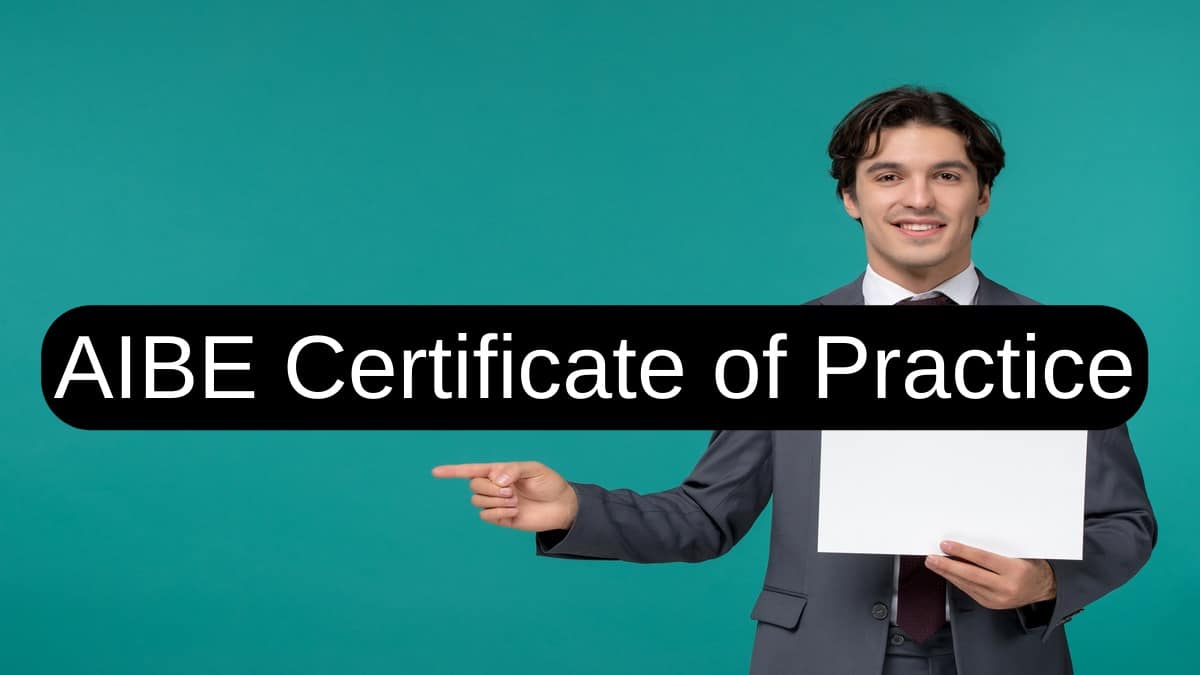AIBE 19 Results: Who is Eligible to Obtain Certificate Of Practice?
The Bar Council of India (BCI) has declared the AIBE 19 results on March 21, 2025. Candidates who emerge successful in the AIBE exam result will be awarded a Certificate of Practice (CoP) to practise law. The AIBE CoP is a mandatory certificate to become an advocate and represent clients in a court of law. In this article, get to know who is eligible to obtain the Certificate of Practice.

Who is Eligible to Obtain a CoP Certificate?
Candidates who clear the All India Bar Examination are eligible to obtain the AIBE Certificate of Practice. Since the bar exam is a qualifying examination, anyone who secures the passing marks will be deemed to have passed AIBE 19 and be eligible to obtain AIBE CoP. The passing marks in AIBE vary for candidates from SC/ST categories and those from general/OBC categories. The AIBE cut-off to obtain the CoP are given below -
AIBE Cut-off
Category | Passing % | Passing Marks |
General/OBC | 45% | 45 marks out of 100 |
SC/ST | 40% | 40 marks out of 100 |
Has the AIBE 19 Cut-Off Changed?
In AIBE 19 final answer key, 7 questions have been withdrawn. As a result, the total marks in AIBE 19 are now 93 marks. The AIBE passing marks to be eligible to obtain CoP will now be calculated out of 93 marks. Given below are the detail
AIBE 19 Revised Cut-Off Marks for CoP
Categories | AIBE Revised Passing Marks |
General/OBC | 42 out of 93 marks |
SC/ST | 37 out of 93 marks |
COP for Candidates Whose AIBE 19 Result is Withheld
BCI has withheld the AIBE 19 result for those candidates who had uploaded other documents in place of an enrolment certificate and for those who had signed an undertaking. Such candidates must upload the enrolment certificate through their login to access the AIBE 19 result and be eligible for COP.
Final-year law students who have cleared AIBE also need to clear their final semester law exams before they become eligible for COP. The AIBE 19 result for such candidates is provisional and dependent on whether they clear their law degree exams.
How BCI Issues CoP?
BCI will first issue an online Certificate of Practice as known as the Dummy CoP. Qualified candidates can access the online Cop through the All India Bar Examination app. The online CoP does not have any validity and is merely to check the details for any discrepancies. Candidates can review the details and request for correction in particulars such as name, father’s name, enrolment number, and so on.
After the discrepancies (if any) in the online CoP are rectified, BCI will issue a physical copy of the Certificate of Practice. The copy of the CoP will be despatched to the respective state bar councils from where the qualified candidates are required to collect them in person.
Popular Courses and Specializations
Questions related to AIBE
On Question asked by student community
Hi dear candidate,
The results of AIBE 20 Law exam were released on 7th January 2026 on the official website of All India Bar Examination. You will need to enter your roll number, password and date of birth to obtain your results.
Know more steps with the link below of
Hello,
The above link provides you with the AIBE questions with answers that enhance your preparation.
Hope it helps with your query. Good luck.
Hello,
You can access AIBE (All India Bar Examination) previous year question papers with answers in Hindi from the mentioned link below:
https://law.careers360.com/hi/articles/aibe-previous-year-question-papers
Hope it helps.
Hello,
Here you can access AIBE 20 exam which was held on 30 November 2025 answer key set-wise A, B, C, D from the mentioned link below:
https://law.careers360.com/articles/aibe-20-answer-key-2025-pdf-all-india-bar-examination
Hope it helps.
Hello,
You can get the AIBE SET-B Question Paper along with answer keys from the Careers360 website. Practising these papers will helps you to understand the exam pattern, to identify the important topics, to improve time management, and overall it enhances your exam preparation.
LINK: https://law.careers360.com/articles/aibe-20-set-b-question-paper-pdf
Hope it helps!
Start a career in Law. Admissions Open for LLB courses for
Among top 100 Universities Globally in the Times Higher Education (THE) Interdisciplinary Science Rankings 2026
RV University, Bangalore | Law Admissions 2026
ApplyExcellent curriculum; an impressive range of electives, besides core law courses. Up to 100% merit scholarship on a first-come, first-served basis
UPES Integrated LLB Admissions 2026
ApplyRanked #18 amongst Institutions in India by NIRF | Ranked #1 in India for Academic Reputation by QS Rankings | 16 LPA Highest CTC
VIT Chennai Law Admissions 2026
Apply#10 in India by NIRF Ranking | NAAC A++ accredited | Approved by BCI | Scholarships Available
Sharda University Admissions 2026
ApplyNorth India's Largest Educational Group | NIRF Ranked 87 | NAAC A+ Grade | Highest Package 1.6 Cr
Chandigarh University Admissions 2026
ApplyNAAC A+ Accredited | Among top 2% Universities Globally (QS World University Rankings 2026)
